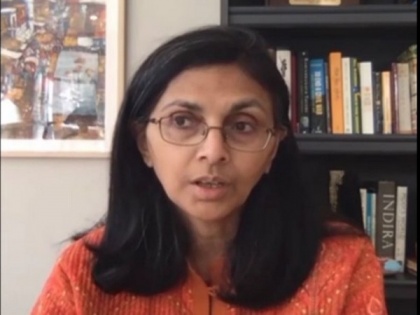Indian govt recognising that changing stance allows to think how modern-day agriculture works: USIBC chief on repealing of 3 farms laws
By ANI | Published: November 20, 2021 03:55 PM2021-11-20T15:55:23+5:302021-11-20T16:05:01+5:30
The Indian government is recognising that changing stance allows more "time and space" to think about how modern-day agriculture can work in the country that has broad base reliance on this sector, United States-India Business Council (USIBC) president Nisha Biswal said.

Indian govt recognising that changing stance allows to think how modern-day agriculture works: USIBC chief on repealing of 3 farms laws
The Indian government is recognising that changing stance allows more "time and space" to think about how modern-day agriculture can work in the country that has broad base reliance on this sector, United States-India Business Council (USIBC) president Nisha Biswal said.
Her remarks came when she was asked about her views on the withdrawal of three contentious farm laws by Prime Minister Narendra Modi. Prime Minister Modi on Friday announced the repeal of the three farm laws.
"India has been trying to align and modernise its agricultural policies and sector, which is extraordinarily difficult in any circumstances. Certainly agriculture is such an important aspect of Indian economy and as a result of it, it is also an important aspect of Indian political fabric," she told ANI.
"So I think that the government is recognising that changing stance also allows more time and space to kind of think about how modern-day agriculture can work in a country that has broad base reliance on agriculture," she added.
Noting that a lot of policies India was seeking to put in place were certainly welcome by industries, Biswal, however, said that the policies had to be rolled out in a socially sustainable manner.
"A lot of policies India was seeking to put in place and reforms that it is seeking to do were certainly welcome by industries but we also understand the policies had to be rolled out in a way that is socially sustainable and perhaps we have ways to go and this was an important move by the government," Biswal said.
Prime Minister Modi on Friday announced the repealing of the three Central farm laws. Farmers have been protesting the Centre's three farm laws since they were passed in 2020.
The three farm laws are as follows: The Farmers' Produce Trade and Commerce (Promotion and Facilitation) Act provides for setting up a mechanism allowing the farmers to sell their farm produces outside the Agriculture Produce Market Committees (APMCs).
Any licence-holder trader can buy the produce from the farmers at mutually agreed prices. This trade of farm produces will be free of mandi tax imposed by the state governments.
The Farmers (Empowerment and Protection) Agreement of Price Assurance and Farm Services Act allows farmers to do contract farming and market their produces freely.
The Essential Commodities (Amendment) Act is an amendment to the existing Essential Commodities Act.
( With inputs from ANI )
Disclaimer: This post has been auto-published from an agency feed without any modifications to the text and has not been reviewed by an editor
Open in app